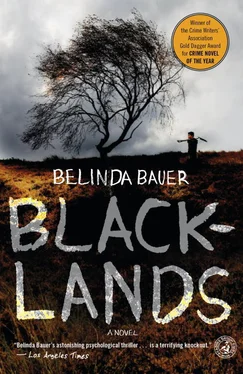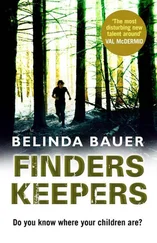The carefully hand-printed words on the page had exploded in Avery’s brain like a bomb. He knew who WP was, of course, just as he knew MO, and LD, and all the others. They were triggers in the loaded gun of his mind, which he could use to fire off streams of exciting memories whenever he wanted. His brain was a filing cabinet of useful information. Now, as his body shut down to allow his mind to work more efficiently, he allowed himself to slide open the drawer marked WP and to peer inside—something he had not done for some years.
WP was not his favorite. Generally he used MO or TD; they had been the best. But WP was not to be sniffed at and, inside that mental drawer, Avery hoarded a wealth of information gleaned from his experience, from newspaper and TV reports of the child’s disappearance, and, later, from his own trial which had been moved to the picturesque Crown Court in Cardiff—supposedly to give him a fighting chance, which was laughable, when you thought about it.
William Peters, aged eleven. Fair hair in a fringe over dark blue eyes, pink cheeks on pale skin, and—for a short while—a grin that almost swallowed his ears it was so wide.
Avery had stopped at the crappy little village shop. He’d bought a ham sandwich because burying Luke Dewberry had been hungry work. Out of habit, he’d glanced at the local paper, the Exmoor Bugle .
Local papers were a rich source of information for a man like him. They were filled with photos of children. Children dressed as pirates for charity; children who had won silver medals at national clarinet competitions; children who had been picked for the Under-13s even though they were only eleven; whole teams of children in soccer or cricket or running kit, each with his or her name conveniently printed in the caption below. Sometimes he would call them, pretending to be another reporter wanting the story for another newspaper. It was so easy. Bigheaded parents were only too happy to milk their child’s paltry success and would hand over the phone. Only rarely did they snatch the phone from their child’s ear in time—alerted by the confused shock on a young face.
Sometimes he just used a child’s name and details to strike up conversation with random kids in parks and playgrounds. “How old are you? You must know my nephew, Grant? The one who just got the lifesaving award, you know? Yeah, that’s right. I’m his uncle Mac.” And he’d be off.
Anyway.
He’d just got back in his van with the sandwich when he saw William Peters—Billy, his mother called him later in the papers—go into the shop. Avery only caught a fleeting glimpse of Billy but it was worth waiting until he came out, he thought. He ate the ham sandwich while he did just that. He hadn’t bought the Bugle on the basis that it was too close to home. He didn’t live on Exmoor but this was where he’d just buried a body, so he’d made a mental note to avoid local children. But there was something about Billy…
The boy took a while and when he came out, Avery knew.
Now, all these years on, Avery still managed to recapture some of the thrill of that moment when he identified a target. The way he hardened, and spit filled his mouth, so that he had to swallow to keep from drooling like an idiot.
Billy was kind of on the thin side, but he had a little-boy jauntiness that was very appealing. He walked away from Avery’s van, blissfully unaware that he’d just chosen the last meal of his young life—a bag of Maltesers. It made Avery smile to watch the child swagger down the street, crunching on his sweets, kicking a plastic milk bottle along the gutter. He liked a confident child; a confident child was far more likely to be eager to help—to lean through the window just that little bit farther…
He put the van into gear and rolled down the street, pulling his map towards him…
Avery shivered.
“Goose walk over your grave?”
Officer Ryan Finlay leered through the hatch at Avery, his drinker’s nose poking into Avery’s space; his watery blue eyes darting about. The killer in the cell felt himself knot inside with hatred.
“Officer Finlay. How are you?”
“Right enough, Arnold.”
Avery hated him some more.
Arnold.
As if they were old friends. As if one night soon Ryan Finlay might crook an arm at him at lockup and say, “Come on, lad, let’s you and me put a couple away down the Keys.” As if Avery might even enjoy the craic, sipping a black and tan, surrounded by a forest of thick-necked, thick-headed screws talking about how hard it was to lock and unlock doors and shepherd docile thieves between floors.
“Anything interesting?” Finlay nodded at the letter in Avery’s hands. In that instant, Avery knew that Finlay had already read it, that Finlay had been disappointed at being unable to stick his thick black pen through anything in it, and that this question now was a clumsy attempt to probe for the information he knew must somehow be contained therein.
“Just a letter, Officer Finlay.”
“While since you had one, isn’t it?”
“Yes, it is.”
“Well, that’s nice.”
“Isn’t it?”
Finlay took a moment to think of his next lumbering line of attack.
“News from home?”
“Yes.”
Again Finlay was momentarily lost. He took his time picking something troublesome out of his left nostril. Avery controlled himself admirably.
“What’s happening there, then?”
While Finlay had picked his nose, Avery had anticipated this very question and prepared for it in full.
“Nothing special. My cousin. He’s a computer nut. I had an old word processor—an Amstrad. He says it’s a collectable or some such. Always trying to get it off me.”
“Geek, is he?”
“A geek. That’s right.”
Finlay looked around, acting casual. “You going to let him have it?”
Avery shrugged. Then he smiled, putting everything into it. “We’ll see.”
Finlay was a prison officer with twenty-four years on the job, but in the face of that smile his suspicion melted away and he couldn’t help feeling that he and Avery suddenly shared some secret that was really quite wonderful.
Finlay had interrupted his train of thought, but that was good, really. That train was too good to stop in daylight. It was a nighttime train, though not a sleeper. He smiled inwardly at that. He’d go back over WP tonight; right now he was interested in the possibilities that this odd little letter represented. Possibilities were the first casualty of prison life. They were curtailed as soon as the cell door clanged. And for most prisoners they would never be properly recovered. Even men who served only months or a few years suddenly discovered that the possibilities in their lives had been confiscated like shoelaces. Before they had hoped for office jobs, now they could expect only laboring or the dole. Cons lived by a whole different concept of possibility. For lifers, possibilities came to mean even smaller things: the possibility of chips instead of mash, chops instead of mince.
Avery didn’t know who SL was, but for clarity he decided to think of SL as male.
SL had been very careful about this letter. He’d been smart enough to realize or to learn that letters did not pass to and from pedophiles and serial killers without the busy pen of the censor crawling all over them. So he’d kept it short and cryptic. He’d also been smart enough to know that bare initials would mean something to Avery.
But of course, the return address was the giveaway. When he’d first been incarcerated, Avery had had dozens of letters from in and around Shipcott. Most had been insulting or pleading, and those were easily forgotten, but he’d had one from Billy Peters’s sister, if memory served (as it would have to—he’d not been allowed to keep his huge volumes of correspondence). It was the usual thing—wanting to know what had happened to Billy; where he was buried. She had begged Avery to put her mother out of her misery. He’d written back pointing out the charming coincidence—that Billy had begged him to do the same for him.
Читать дальше
Конец ознакомительного отрывка
Купить книгу












